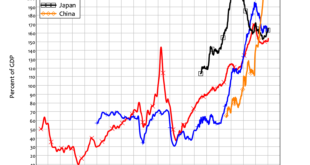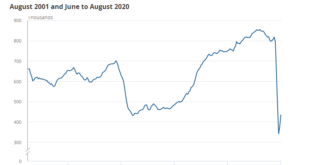Ann Pettifor’s The Coming First World Debt Crisis (Pettifor 2006) was the first book to warn of the approaching 2007 Global Financial Crisis. More than decade after that crisis, its cause—excessive private debt, created primarily to finance asset bubbles rather than productive investment—is still with us, while we are entrapped in a pandemic crisis, and on the cusp of a climatic one.Figure 1: Private debt levels over the history of capitalismLooking forward to the next ten years, and given so...
Read More »Looking ahead after COVID: what role for the state?
As part of this series celebrating PRIME’s tenth anniversary, we are looking forward to the next ten years. This contribution by Laurie Macfarlane looks at the future role of the state. ——- John Maynard Keynes famously wrote: “Practical men, who believe themselves to be quite exempt from any intellectual influence, are usually the slaves of some defunct economist.” For the past 40 years, society has been the slave of a not-yet-defunct set of economic ideas. These ideas have shaped the way...
Read More »Austerity: a symptom of globalised rentier capitalism’s failure
Even while the economy is recast for today’s pandemic on the back of the dismal failures of the past decade, austerity is already rearing its ugly head. At one level there must be politics here. The public must not be allowed to think that socialising the economy to meet a pandemic means the economy might be socialised when the pandemic is over. Likewise, obsessing about excessive debt means the greatly more pressing and more dangerous reality of deficient expenditure is side-lined. But it’s...
Read More »Celebrating 10 years of PRIME and facing the 2020s..
As loyal readers know, we are a network of macro- and political economists and environmentalists influenced by Keynes or concerned to restore his thinking. In our mission statement, drafted back in 2010, we considered “that conventional or ‘mainstream’ economic theory has proved of almost no relevance to the ongoing and chronic failure of the global economy and to the gravest threat facing us all: climate change.” We stand by that statement. As the globalised and financialised economy...
Read More »Why we’re backing Universal Basic Services (UBS)
PRIME is supporting a new programme to develop and communicate universal basic services (UBS) as a route to wellbeing for all, greater equality, full and decently-paid employment, and ecologically sustainable economic activity. UBS is a framework for policy and practice that fosters collective responsibility, exercised through public institutions, to meet needs we all share. It recognises that income has two dimensions: one is money and the other is ‘social income’, derived from in-kind...
Read More »Financing the Future We Want with the TNI
This is a You Tube recording of a discussion organised by the Trans National Institute (TNI) on Wednesday, 7th October, 2020. Jayati Ghosh, Ann Pettifor, Alvin Mosioma and Oscar Reyes hold a stimulating conversation on how to finance a recovery from COVID-19 and invest in a just climate transition. They address key questions such as what options and mechanisms do we have in the current circumstances to avoid austerity and invest in a just transition? How can we ensure that the Global South...
Read More »UK GDP – the Q2 close-down, and the distorting effect of ‘imputed rental’
On Wednesday (30 September) the Office for National Statistics published its second estimate of GDP for the second quarter of 2020, April to June. The very marginally positive news is that the fall, between Q1 and Q2, was reduced from 20.4% to 19.8%. Since this was still the largest recorded quarterly fall since records commence in 1955, this is hardly a cause for jubilation – and even less so since the Q1 drop was raised from -2.2% to -2.5%. As we discuss below, the position would...
Read More »How to transfer power away from markets to democratically elected governments
This article was written in July, 2020 for Project Syndicate where it was finally published on 1st October, 2020. The global economy suffers from dangerous imbalances. Economic goals for endless ‘growth’ lead to rises in heat-trapping gases that conflict with the earth’s limited capacity to manage rising toxic emissions. Urbanisation, pollution, soil erosion, deforestation, depletion of wildlife, degradation of marine ecosystems – these and other economic activities disturb the equilibrium...
Read More »How to transfer power away from markets to democratically elected governments
This article was written in July, 2020 for Project Syndicate where it was finally published on 1st October, 2020. The global economy suffers from dangerous imbalances. Economic goals for endless ‘growth’ lead to rises in heat-trapping gases that conflict with the earth’s limited capacity to manage rising toxic emissions. Urbanisation, pollution, soil erosion, deforestation, depletion of wildlife, degradation of marine ecosystems – these and other economic activities disturb the equilibrium...
Read More »This time, Mr Sunak has got it wrong
Till now, I have supported much of what Chancellor Rishi Sunak has put in place, as measures to help the economy through the pandemic. The furlough scheme has proved its worth. But today’s measures are inadequate and disappointing. The new Job Support Scheme, under which the government will pay some 22% of the wages of employees who work at least one third of their usual hours. This compares with the 60% of wages to be paid by the government in October, the last month of the furlough...
Read More » Heterodox
Heterodox


